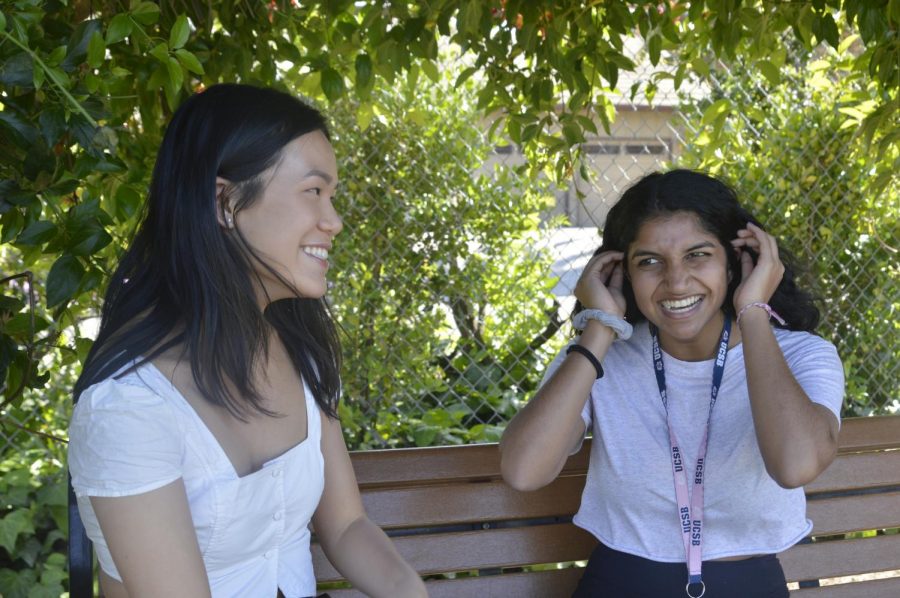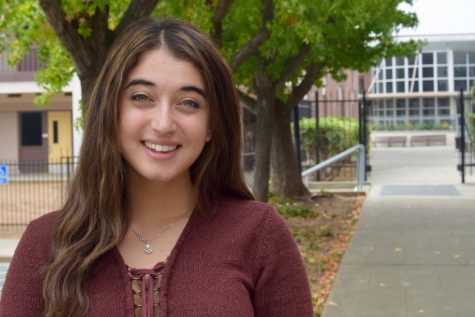Seniors revisit their elementary schools
Five seniors reminisce on the simpler days
May 23, 2019
Walk-a-thons, times tables and “NO SHARING FOOD!” — these are among the many things that remind us of elementary school, the simpler and more blissful days when our biggest worry was getting to the other side of the monkey bars. We’ve come a long way since then, but the friends and memories we created have remained with us. We decided to revisit three nearby elementary schools and talk to former Lincoln, Stevens Creek and Regnart students to hear the good, the bad and the bizarre of being an elementary schooler.
LINCOLN: BANNED SPORTS AND WATERY PIZZA
In the age of elementary school, it was hard for students to socialize or interact in a way other than playing sports during recess and lunch, according to senior Rohan Angajala. It came as a bummer when an overwhelming number of injuries due to recess and lunch activities prompted the administration to ban all sports.
Along with a cut-off from one of his few forms of interaction with others, Angajala also made the mistake of buying the school pizza which was too watery, causing him to throw up on the playground. Angajala still cringes at the thought.
For Angajala, the style of continuous classes in elementary school allowed him and his peers to explore their interests. Weekly art and music classes were a part of this exposure. Even students who had never attended a music class before could be seen at the piano attempting to play. Angajala credits this to the encouragement students received from teachers and the supporting environment, contrasting students’ attitudes in high school.
“In high school, if a kid doesn’t like art, he doesn’t touch it at all,” Angajala said. “If a kid just likes computer science, he just does computer science and nothing else.”
And so in high school, when initially struggling to succeed in all areas of his coursework, Angajala found a passion for political activism.
Now, as a high schooler, there are days when Angajala finds himself kicking through the tanbark of the playgrounds at Lincoln. After the occasional tough day at MVHS, he finds solace by visiting his former school next door, reminiscing on an easier life as well as his struggles back then.
“I’m in disbelief that I even found [elementary school] to be a struggle,” Angajala said. “It reminds me that even what I’m going through right now will be just seen as something silly in the future and that it’s all just part of life.”
STEVENS CREEK: KNOCKOUT AND GOLD RUSH DAY
Lincoln wasn’t the only place banning things. When seniors Mythili Ketavarapu and Samantha Chan were in fifth grade, the entire “Hunger Games” franchise was banned on campus. Any books related to the series were to be removed from all classrooms due to their gory nature and were deemed unsuitable for the naive eyes of elementary schoolers. According to Ketavarapu, “The Hunger Games” was only a mere example of the many things banned at Stevens Creek Elementary.
A memorable, but later banned, basketball game was Knockout. Though a soccer player at heart, Ketavarapu enjoyed the competitive nature of the game. For Chan, her recess was spent doing cartwheels on the grass with her best friend.
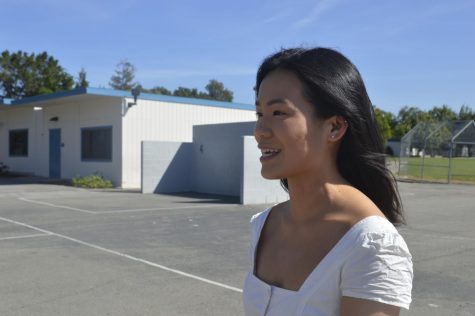
Chan admits that a lot of her time in elementary school revolved around a single friend, but that over the years, she’s become less reserved and more outgoing. Eventually cutting ties with the friend in question, Chan met Ketavarapu through mutual soccer friends. The two went on to become close friends throughout middle school and high school.
Certain activities stuck out to the pair. In third grade, it was animal-related activities such as dissecting owl pellets, caring for crayfish and wiping snail slime off their hands. In fourth grade, it was Gold Rush Day. Ketavarapu remembers panning for “gold,” which was, in reality, golden spray-painted rock that was used as a form of currency at various booths. She also remembers dressing in her best pink cowboy boots to suit the day’s theme.
Other popular school events included the annual Walk-a-thon and Halloween themed Pumpkin Panic, a family event with jump houses, slides, a cake walk, a dunk-a-teacher booth and raffles. Chan remembers walking through the haunted house created by fifth grade teacher Mr. Blaker, who happened to be Ketavarapu’s favorite teacher at Stevens Creek. Blaker was known for his microphone, his bald head and the smell of coffee in his classroom.
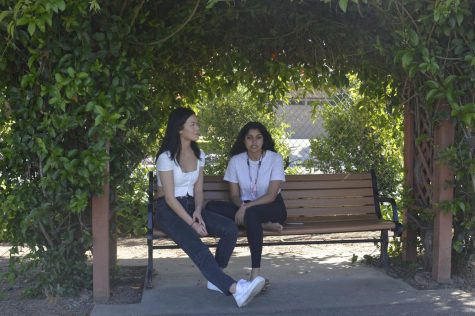
“I really liked Mr. Blaker,” Ketavarapu said. “I liked his teaching attitude. He was funny, and something about his microphone made him seem untouchable. He was just so far away.”
Ketavarapu recalls another teacher, Ms. Vidunas, who left an impact on her in elementary school, particularly as she was going through the Human Growth and Development unit.
“She scared me and I didn’t even have her,” Ketavarapu said. “Sex ed was terrifying. She was slapping pads on the walls, saying, ‘This is what you will be using.’ And I’m like, ‘I’m not going to wear a diaper.’”
REGNART: MONKEY BARS AND MUSICALS
Looking at the play structure in front of them, seniors Mahima Kumar and Maddie Yung remember a time when everything seemed gigantic. The bars, which they once couldn’t reach, are now at their chest. The lookout structure that could once fit four of their friends is now barely big enough for one person. Kumar and Yung both attended Regnart Elementary School. For them, elementary school was the time when they tried tricks on the monkey bars, went on memorable field trips and performed in historical musicals.
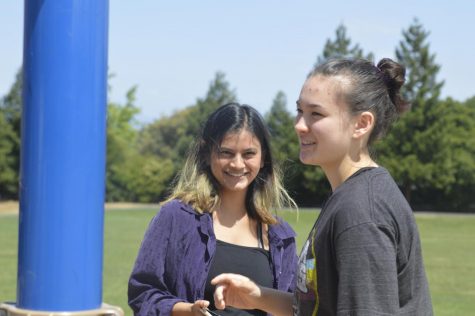
In third grade, Kumar and Yung both had Mrs. Gadepally, who made it mandatory for students to give weekly speeches. This seemed like a daunting task at the time, but they have now come to realize how important Gadepally’s class was — especially the way she treated her students.
“She’s gotten crazy kids, but she still treats them with the same respect as she gives adults,” Yung said.
Looking back, Yung says she these third grade weekly speeches is probably what ignited her speech anxiety — she never got full score on them, but she is still grateful for the experience. Yung and Kumar still visit Mrs. Gadepally whenever they can.
Two years later in fifth grade, Kumar and Yung got to explore their theatrical side by acting in a musical about the Revolutionary War.
“[The musical] was the highlight of my entire school career,” Yung said. “I wasn’t at the point where I was scared of acting in front of people. I was Benjamin Franklin and I think I choreographed a song for us and I wore a wig. It was really fun because that was how we learned about history.”
As Kumar and Yung look back, they can’t help but laugh at the memories they shared. Kumar believes that their friend group is luckier than most because she, Yung and a few other friends from their Regnart days are still very close. Even through middle school and high school, their friend group has remained intact.
“I’ve grown apart from some of them, but I haven’t stopped talking to them completely,” Yung said.
Looking ahead at going to college, Yung is staying close to home while Kumar is leaving the familiar environment to go to Los Angeles. She relates this feeling of “end” to a concept that Mr. Clarke is teaching in AP Literature called the “detachment phase.”
“Either consciously or unconsciously, I feel like I’ve been going through [the detachment phase] where […] I just don’t feel the same connection to certain things at school as I did maybe a year ago or even a few months ago because now it’s solidified that May 1st has passed. I know I’m leaving so my brain is trying to make that easier on me.”
Detachment, defined by Oxford Dictionaries, is the state of being objective or aloof. In the last month of high school, Kumar prioritizes spending time with her friends over focusing on schoolwork or extracurriculars.
“I’m just going to spend time on being with my friends before we are all over the country,” Kumar said. “Just so that I have good memories of my last bit of high school.”



